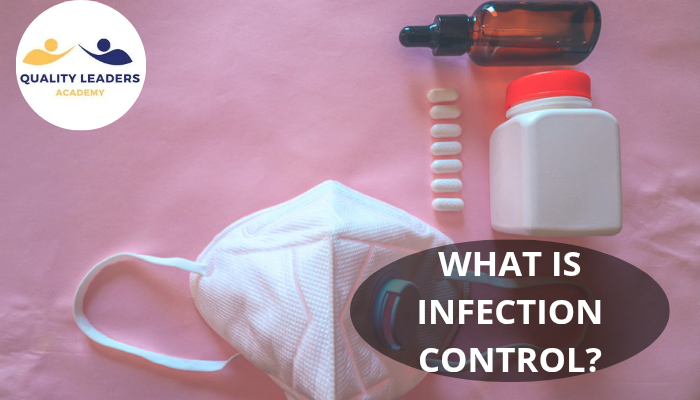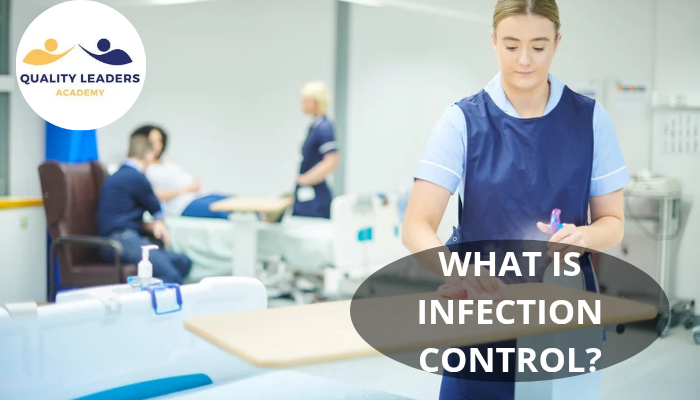Infection control is essential in healthcare to prevent and manage the spread of infections in medical settings and the community. Effective infection control protects patients, healthcare workers, and visitors from healthcare-associated infections (HAIs), reducing morbidity, mortality, and healthcare costs.
WHAT IS INFECTION CONTROL IN HEALTHCARE?
Infection control involves policies, procedures, and practices that prevent the transmission of infectious agents. It includes standard precautions like hand hygiene, personal protective equipment (PPE), and environmental cleaning. Surveillance of infection rates, outbreak investigation, and healthcare staff education are also key components.
SEVEN PRINCIPLES OF INFECTION CONTROL

- Hand Hygiene: Proper handwashing with soap and water or alcohol-based sanitizers to eliminate pathogens.
- Use of Personal Protective Equipment (PPE): Wearing gloves, masks, gowns, and eye protection to create barriers against infections.
- Respiratory Hygiene and Cough Etiquette: Covering the mouth and nose when coughing or sneezing and proper tissue disposal to prevent airborne transmission.
- Safe Injection Practices: Use sterile needles and syringes for each injection to prevent bloodborne infections.
- Environmental Cleaning and Disinfection: Regular sanitization of surfaces and equipment to eliminate infectious agents.
- Waste Disposal: Proper segregation and disposal of medical waste to prevent contamination.
- Education and Training: Ongoing training for healthcare workers on infection control protocols.
INFECTION PREVENTION AND CONTROL RESOURCES
The World Health Organization (WHO) provides extensive resources on infection prevention and control, offering evidence-based guidelines applicable in various healthcare settings.
THREE METHODS OF INFECTION CONTROL
- Engineering Controls: Modifying healthcare environments, such as installing hand hygiene stations and ensuring proper ventilation.
- Administrative Controls: Implementing policies like staff training, infection surveillance, and adherence to standard procedures.
- Personal Protective Equipment (PPE): Using gloves, masks, and gowns to minimize exposure to infectious agents.
WHY IS INFECTION CONTROL IMPORTANT?
- Protects Patient Health: Prevents HAIs, reducing hospital stays and improving outcomes.
- Safeguards Healthcare Workers: Reduces occupational exposure to infections.
- Reduces Healthcare Costs: Minimizes expenses related to prolonged hospitalizations and additional treatments.
- Prevents Antimicrobial Resistance (AMR): Limits the spread of resistant bacteria by controlling infections.
- Enhances Public Health: Reduces the spread of infectious diseases in communities.
- Maintains Healthcare Reputation: Strengthens patient trust by ensuring safety.
- Ensures Regulatory Compliance: Meets health authority and accreditation standards.
- Improves Efficiency: Prevents infection outbreaks that disrupt healthcare operations.
- Supports Global Health Initiatives: Contributes to worldwide infection prevention efforts.
- Encourages Best Practices: Ensures adherence to infection control protocols.
CHALLENGES IN INFECTION CONTROL
Despite advancements, infection control faces several challenges. The emergence of new pathogens, antibiotic resistance, and non-compliance with protocols increase infection risks. Healthcare facilities must continuously update policies, improve training, and adopt innovative technologies to enhance infection prevention.
ROLE OF TECHNOLOGY IN INFECTION CONTROL
Modern technology plays a crucial role in infection prevention. Automated hand hygiene monitoring, AI-driven infection surveillance, and UV disinfection systems help healthcare facilities reduce infection rates. Implementing electronic health records also improves the tracking and management of infection outbreaks.
REGULATORY STANDARDS FOR INFECTION CONTROL
International health organizations, such as the CDC and WHO, provide infection control guidelines to ensure patient safety. Compliance with these standards is mandatory for healthcare accreditation. Regular audits and staff training are essential for maintaining infection control effectiveness.
THE ECONOMIC IMPACT OF INFECTIONS IN HEALTHCARE
Healthcare-associated infections (HAIs) lead to increased hospital stays, higher treatment costs, and legal liabilities. Hospitals investing in robust infection control measures can reduce overall healthcare costs and improve patient outcomes. Preventative measures ultimately save resources while enhancing care quality.
INFECTION CONTROL IN NON-HOSPITAL SETTINGS
Infection prevention is vital beyond hospitals, including in dental clinics, nursing homes, and home healthcare services. Proper hygiene, vaccination, and environmental disinfection play crucial roles in minimizing infection risks in these settings.
COMMUNITY-BASED INFECTION CONTROL MEASURES
Public awareness is essential in reducing infections beyond healthcare settings. Educating communities about hygiene, vaccination, and disease prevention contributes to overall public health safety. Governments and health agencies run campaigns to promote infection control at the community level.
IMPACT OF INFECTION CONTROL ON GLOBAL HEALTH
Effective infection control has a direct impact on global health security. It helps prevent pandemics, reduce antibiotic resistance, and improve life expectancy. Countries with strong infection control measures experience fewer outbreaks and better healthcare outcomes.
CIC CERTIFICATION AND ITS IMPORTANCE IN HEALTHCARE

Certified Infection Control (CIC) certification is a globally recognized credential that validates expertise in infection prevention. It is essential for healthcare professionals aiming to improve patient safety, reduce HAIs, and implement effective infection control measures.
Earning CIC certification demonstrates a commitment to high healthcare standards and better public health outcomes. Structured training is vital for passing the exam. Quality Leaders Academy provides a comprehensive CIC study course covering key infection control principles, best practices, and exam simulations.
This training prepares candidates for certification and enhances their ability to apply infection control strategies in real-world settings. Investing in the CIC course through Quality Leaders Academy strengthens career opportunities and promotes safer healthcare environments.
Infection control is crucial for safeguarding patient and healthcare worker safety. Adhering to established infection prevention principles reduces infection risks and enhances healthcare quality.
Read also:
Resources:
https://www.cdc.gov/infection-control/media/pdfs/Outpatient-Guide-508.pdf
https://apps.who.int/gb/ebwha/pdf_files/EB150/B150_12-en.pdf
https://iris.who.int/bitstream/handle/10665/341107/9789289055437-eng.pdf
https://www.jhpiego.org/wp-content/uploads/2020/03/IPC_M1_IPC_Introduction.pdf


